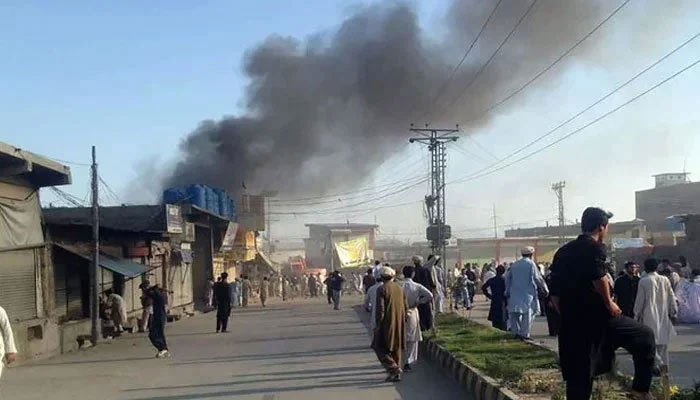No peace in Kurram
Up to half million people in Kurram are struggling to even get the basic necessities needed for survival
The signs that the Kurram peace agreement brokered by the Khyber Pakhtunkhwa government back in January is not working are only growing. As of writing, protesters have held a sit-in for nine days outside the Parachinar Press Club to demand the reopening of major roads. These roads, despite the peace agreement now being well into its third month, continue to remain closed due to the ongoing unrest. The protesters are urging the government to ensure the safety of all major routes in accordance with the recently signed peace agreement. They have also criticised the authorities for failing to provide essential goods, with food and medicine shortages now endangering lives in Upper and Lower Kurram. While most Pakistanis worry about the price of food and gas loadshedding during Ramazan, up to half a million people in Kurram are struggling to even get the basic necessities needed for survival. Ultimately, this speaks volumes of the inability of the January peace agreement to restore normalcy to the former tribal district. The clearest sign that things were not going as planned came last month when an aid convoy heading for Parachinar was attacked and came under fire. This past Sunday, at least three soldiers were martyred and four others sustained serious injuries when terrorists opened fire on security forces in the Chinarak area in the central part of Kurram.
While the authorities are working to implement key facets of the peace agreement by destroying illegal bunkers used by militants and conducting clearance operations, the continuing ability of militants and criminals to carry out such organised violent attacks highlights the challenges when it comes to countering those seeking to plunge the region back into violence and conflict. The inability to restore normalcy in the region has also become a national concern with the PPP issuing a statement and President Asif Ali Zardari also criticising the government’s unilateral decisions. Prime Minister Shehbaz Sharif has assured the PPP leadership of addressing their grievances. However, attaining peace in Kurram was always going to be an uphill task and the PM’s assurances are not likely to change this. The sectarian tensions, militancy, proliferation of illegal arms and other dynamics that caused the outbreak of violence in Kurram last year, leading to the loss of around 130 lives by the time the January peace agreement was signed, have been building up over decades. And the violence that exploded in the region last year was only the latest in the several rounds of protracted clashes that Kurram has experienced over the years.
Nor was the January peace agreement the first attempt to do something about this problem. Such agreements have been around for almost as long as the violence itself and none, unfortunately, have stood the test of time. One thing that has been consistent over this period though is the rocky relationship between those who hold power in the centre and those in Khyber Pakhtunkhwa and the alienation of many of the people in Kurram from the state. Newly integrated districts like Kurram also remain disproportionately marginalised from a socioeconomic standpoint despite their new status. These areas, in many ways, are yet to be properly integrated into the state and lack even the paltry institutions, rules and principles that govern life in much of the rest of the country. Ensuring that the roads in Kurram remain open and safe to use will, in the immediate term, require a step-up in the security operations in Kurram. Over the long term, it will need stronger relations between Islamabad and Peshawar and the socioeconomic uplift of the region's people.
-
 Trump Passes Verdict On Bad Bunny’s Super Bowl Halftime Show
Trump Passes Verdict On Bad Bunny’s Super Bowl Halftime Show -
 Super Bowl 2026 Live: Seahawks Defeat Patriots 29-13 To Win Super Bowl LX
Super Bowl 2026 Live: Seahawks Defeat Patriots 29-13 To Win Super Bowl LX -
 Kim Kardashian And Lewis Hamilton Make First Public Appearance As A Couple At Super Bowl 2026
Kim Kardashian And Lewis Hamilton Make First Public Appearance As A Couple At Super Bowl 2026 -
 Romeo And Cruz Beckham Subtly Roast Brooklyn With New Family Tattoos
Romeo And Cruz Beckham Subtly Roast Brooklyn With New Family Tattoos -
 Meghan Markle Called Out For Unturthful Comment About Queen Curtsy
Meghan Markle Called Out For Unturthful Comment About Queen Curtsy -
 Bad Bunny Headlines Super Bowl With Hits, Dancers And Celebrity Guests
Bad Bunny Headlines Super Bowl With Hits, Dancers And Celebrity Guests -
 Insiders Weigh In On Kim Kardashian And Lewis Hamilton's Relationship
Insiders Weigh In On Kim Kardashian And Lewis Hamilton's Relationship -
 Prince William, Kate Middleton Private Time At Posh French Location Laid Bare
Prince William, Kate Middleton Private Time At Posh French Location Laid Bare -
 Stefon Diggs Family Explained: How Many Children The Patriots Star Has And With Whom
Stefon Diggs Family Explained: How Many Children The Patriots Star Has And With Whom -
 Shamed Andrew ‘mental State’ Under Scrutiny Amid Difficult Time
Shamed Andrew ‘mental State’ Under Scrutiny Amid Difficult Time -
 ‘Narcissist’ Andrew Still Feels ‘invincible’ After Exile
‘Narcissist’ Andrew Still Feels ‘invincible’ After Exile -
 Bad Bunny's Super Bowl Halftime Show: What Time Will He Perform Tonight?
Bad Bunny's Super Bowl Halftime Show: What Time Will He Perform Tonight? -
 Where Is Super Bowl 2026 Taking Place? Everything To Know About The NFL Showdown
Where Is Super Bowl 2026 Taking Place? Everything To Know About The NFL Showdown -
 Chris Pratt Explains Why He And Katherine Schwarzenegger Did Premarital Counseling
Chris Pratt Explains Why He And Katherine Schwarzenegger Did Premarital Counseling -
 Drake 'turns Down' Chance To Hit Back At Kendrick Lamar At Super Bowl
Drake 'turns Down' Chance To Hit Back At Kendrick Lamar At Super Bowl -
 Sarah Ferguson Had A ‘psychosexual Network’ With Jeffrey Epstein
Sarah Ferguson Had A ‘psychosexual Network’ With Jeffrey Epstein




